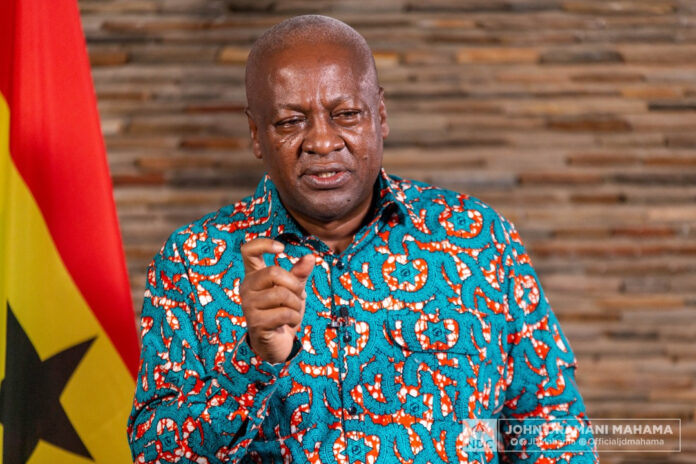
Former President John Mahama says a future NDC government will within one year pay all customers whose investment have been locked up as a result of the financial sector cleanup undertaken by government.
“We will Within one year of being in office pay customers of the collapsed financial institutions all funds locked up. We shall not put together any long plan that will delay the payment,” Mahama stated at the outdooring of his running mate Professor Jane Naana Opoku-Agyemang in Accra.
The Bank of Ghana (BoG) in 2017 embarked on a comprehensive reform agenda to strengthen the regulatory and supervisory framework for a more resilient banking sector.
While some banks had their licences revoked, others have been merged for their inability to raise the new 400 million-cedi minimum capital requirement as of December 31, 2018.
For other banks, the central bank revealed acquired their licences fraudulently and through the use of non-existent capital.
In the midst of the revocation of licenses and the collapse of these banks, the government established the Consolidated Bank of Ghana in which assets and liabilities of seven collapsed banks were transferred.
BoG establishes Consolidated Bank for 5 distressed banks
In all, seven banks- UniBank, The Sovereign Bank, The Beige Bank, Premium Bank, The Royal Bank and Heritage Bank, have been consolidated.
In all, seven banks- UniBank, The Sovereign Bank, The Beige Bank, Premium Bank, The Royal Bank and Heritage Bank, have been consolidated.
At the end of the two-year reform, only 16 banks were able to recapitalised successfully while three merged with five banks receiving bailouts from the government. One bank exited the sector voluntarily.
This has brought the total number of universal banks in the country to 23 from the previous 33.
The 23 banks which survived Ghana’s banking sector clean-up
On the face of the reduction, it may seem that only 10 banks have ceased to exist, but considering that there were mergers and acquisitions, as many as 16 banks ceased to exist.
On the face of the reduction, it may seem that only 10 banks have ceased to exist, but considering that there were mergers and acquisitions, as many as 16 banks ceased to exist.
How?
Here is the breakdown.
Two banks: UT Bank and Capital Bank, were first taken over by GCB Bank in a purchase and assumption agreement.
Seven Banks: The Sovereign Bank, The Beige Bank, Premium Bank, The Royal Bank, Heritage Bank, Construction Bank and UniBank had their licenses revoked and placed under the Consolidated Bank of Ghana.
One Bank exit: The Bank of Baroda as part of its reforms willingly folded up operations in the country and exited.
One Bank exit: The Bank of Baroda as part of its reforms willingly folded up operations in the country and exited.
Six Banks merged (3 mergers): First Atlantic Merchant Bank Limited and Energy Commercial Bank, OmniBank Ghana Limited and Bank Sahel Sahara Ghana and First National Bank and GHL Bank Limited reached merger agreements. What this means is that each of these banks ceased to exist as they initially did.
This now leaves only 23 functional universal banks in the country.
This now leaves only 23 functional universal banks in the country.
Governor of the BoG noted the 23 banks are “better capitalized”, “more liquid”, “more robust” and make for a better economy.
Source: Ghana|Starrfm|103.5FM




0 Comments